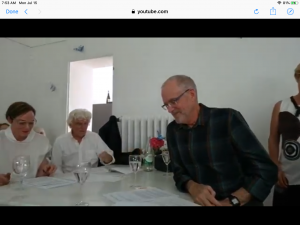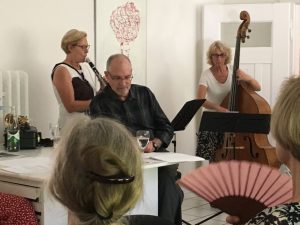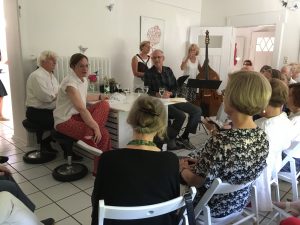Writing is a Kind of Air-Resistance
Schreiben ist eine Art von Luftwiderstand
I have enjoyed a five-year exchange of “public letters” with the poet and artist Johanna Hansen, co-editor of the German literary journal Wortschau. Our exchange, usually two letters a year (mine in English and translated into German), ranged of course over many topics: poetry, longing, Bach…the color blue… and of course Paris, where Johanna and I met while in residency in the Cité des arts internationale in the winter and spring of 2014.
These were gathered into a marvellous book, published by Wortschau in 2019.
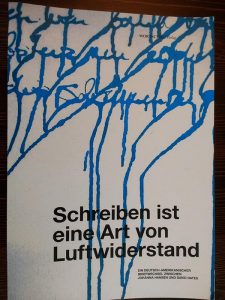
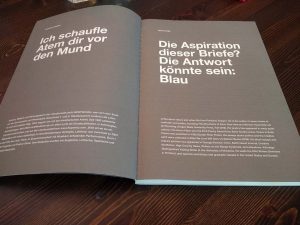
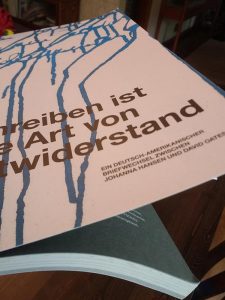
In July of 2019 we launched this book in Düsseldorf, Germany, in an unforgettable performance of readings and jazz improvisation. Johanna and I read (with co-editor Wolfgang Allinger reading German versions of my English)… and the duo ContraSax created sound intervals fashioned from Bach and Gershwin and pure inspiration.
For this event Horatio Law created an installation of folded butterflies fashioned from pages of text and music, sometimes manipulated with fire. They were strangely touching evocations of fragility and beauty.
* * * * *
Watch video of the launch:
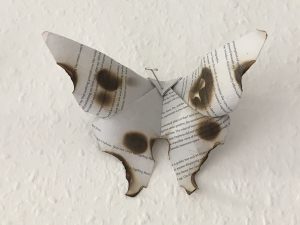
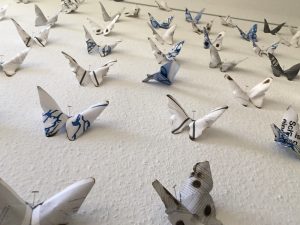
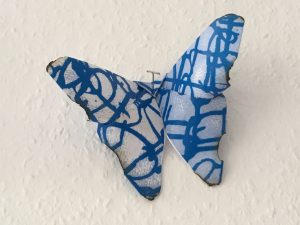
Letter from Nowhere (Letter #1 for Wortschau)
Dear Johanna:
The nowhere-ness of Portland is something I believe in. Portland is on the edge of the world, wedged a hundred miles inland along a great yet mostly forgotten river, lost in the upper left-hand corner of the continent. We are not-Seattle, not-California. Where, exactly? No one knows.
Please do not think I mean anything humble or cringing about our “nowhere-ness.” Our prophet Thoreau says: There are lights arriving here nightly from unthinkably far away. No place is provincial, really. Unless it thinks itself so.
Far from anywhere, we go about living well. We develop our palates, sink our roots, relish the long cool winter with coffee and beer and pinot noir and books and friends. In our eternal wet drizzle we walk, well-clad, welcoming “sun breaks” and dry gray days when they come. We write, we enjoy, we live deeper into our place. Our no-place.
* * * * *
Yet in Paris, where you and I were neighbors for those months, I saw evidence to the contrary every time I set foot outside our atelier. For I saw our shoes seemingly everywhere (Nike is headquartered in Portland), and even our dowdy, practical jackets and fleeces (Columbia Sportswear). This is weird to me – our little town, lost in the woods, clothing the world?
It should not have surprised me. Where I live was reshaped a century and a half ago by the clothing fashions of London and Paris. Literally reshaped. Hollowed out. Left emptier. Here in the northwest of North America we are as far as one can get from Europe, and yet a gentlemanly need for a top hat of beaver skin meant organizing a global cartel that drove the beaver extinct in most of our streams. When the fashion shifted to top hats of silk instead of beaver, around 1850, the damage had been done.
Without beavers and their dams, forests are different places. Beaver-ponds in swift-running mountain streams slow down the snowmelt and rain runoff. Their dams catch debris and become tangles of fallen timber. Behind them, silty accumulations form grassy edges that grow eventually into meadows. And in time forest trees step down into the meadows. All the while, trout and salmon are feeding and spawning in the shade of willows and alders, deer and elk coming to browse, wolves following to harvest these in turn.
Today, rivers rush past. The forests stand but with less life. How to measure the missing dimensions of complexity? How to feel them properly, absent so long?
O Johanna, come hike with me along our streams – they are still beautiful! The woods close in around them like forgiveness. Always bigger than you remember. Bigger and deeper than you can imagine. Despite what we have done to them.
We could try to figure this out, you and I: What exactly is our relation, here, to that populous world so far away – and yet, one must conclude, also so near? And what is the nature of hope, of restoration?
* * * * *
What happened in Paris? You gave me your poem, “Blau ist ein Lockvogel.” I spent time with my German dictionary, roughed out a translation. . . and felt a sudden kinship. Same thing I sensed in talking to you that first evening at the “picnic in the parking lot” beside our big Residency building. Strange, no? Such correspondences, such affinities, across such distances of place and language.
What is near and what is far? From an airplane, everyplace is “here,” and from the perspective of global money-making, no place is out of reach. It is a truth universally acknowledged, that the world has become small.
But it is not true. On foot is the only true measure, and at that scale there are (as our poet William Stafford says), millions of secret places. And all these unknown corners and crannies are safe places, what the biologists call “refugia”– where the vanished and the unknown may abide, waiting their turn to reappear, to build and rebuild the world. Even our beavers and salmon, slowly, can make their way back.
At the intimate scale, the scale of the senses and the footstep, the world is unthinkably huge. Person by person we explore it, place by place, word by word. I am glad my path crossed yours. My world is bigger because of it: more full of secrecy and unforeseen connection.
* * * * *
About five years ago the New York Times began running stories about Portland, to our great surprise. Once or twice a week, it seemed. Our food. Our microbrews. Our trolley-car neighborhoods, our music, oh on and on they went. And the stories are still appearing! We have become a fad. Our good life up here is suddenly no secret.
Well. Times change. Sooner or later, some other place will become the darling of the Global Market, and we will be forgotten again. We will still be here, learning to live well, trying to connect with each other ever more snugly.
Some of our connections will be with close kindred far away.
Thanks for writing –
David
